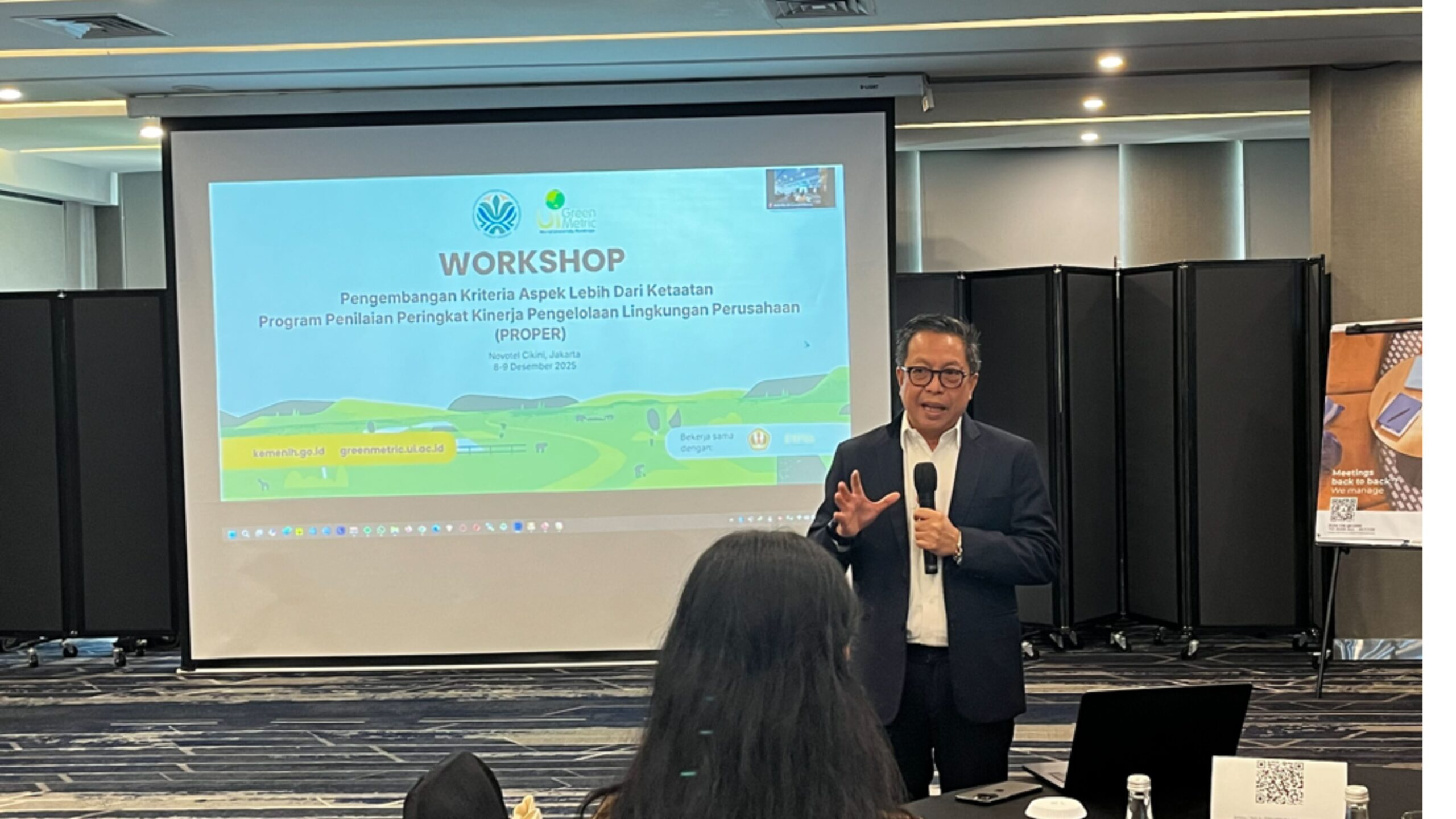Jakarta, Indonesia — 8–9 Desember 2025
UI GreenMetric bekerja sama dengan Badan Pengelolaan Lingkungan Hidup (BPLH) menyelenggarakan Workshop Pengembangan Kriteria Aspek Lebih dari Ketaatan Program Penilaian Peringkat Kinerja Pengelolaan Lingkungan Perusahaan (PROPER). Kegiatan ini dibuka oleh Dr. Rasio Ridho Sani, M.Com., MPM, Deputi Pengendalian Pencemaran dan Kerusakan Lingkungan BPLH sekaligus inisiator PROPER sejak 1995, yang menegaskan komitmen pemerintah dalam memperkuat kolaborasi untuk pengembangan instrumen penilaian yang lebih komprehensif. Kehadiran Dr. Vishnu Juwono, S.E., MIA, selaku Kepala UI GreenMetric, pemeringkatan universitas global yang kini diikuti 1.745 partisipan dari 105 negara, turut menunjukkan sinergi kedua institusi dalam mendorong penguatan indikator keberlanjutan di tingkat nasional dan internasional.
“Melalui PROPER, kami mendorong pengembangan inovasi sosial untuk tidak hanya memenuhi kewajiban minimum, tetapi juga menunjukkan kinerja lingkungan yang inovatif, transparan, dan berdampak nyata. Pengembangan kriteria ‘lebih dari ketaatan’ ini penting untuk memastikan PROPER tetap relevan dengan tantangan lingkungan masa kini serta mampu memotivasi perusahaan menjadi pelopor dalam perlindungan lingkungan. Kolaborasi dengan UI GreenMetric dapat memperkaya pendekatan kami, terutama dalam memperkuat indikator keberlanjutan yang terukur dan kredibel di tingkat nasional.” Ujar Dr. Rasio Ridho Sani, Deputi Pengendalian Pencemaran dan Kerusakan Lingkungan, Badan Pengendalian Lingkungan Hidup (BPLH).
Senada dengan hal tersebut, Dr. Vishnu Juwono, S.E., MIA menyampaikan, “UI GreenMetric kini telah menerapkan asesmen keberlanjutan untuk 1.745 universitas dan 71 kabupaten/kota di Indonesia—sebuah capaian yang menunjukkan besarnya potensi transformasi ketika komitmen dan inovasi dijalankan secara konsisten. Karena itu, kami menyambut baik kolaborasi dengan BPLH dalam pengembangan aspek ‘lebih dari ketaatan’. Inisiatif ini memungkinkan perluasan dampak asesmen kami ke sektor pemerintahan dan perusahaan, sekaligus mendorong praktik pengelolaan lingkungan yang lebih bertanggung jawab serta berkontribusi pada pencapaian target lingkungan nasional.”
Workshop ini melibatkan akademisi, institusi pendidikan, dan para ahli lingkungan untuk memperkuat inovasi sosial melalui penguatan peran institusi pendidikan sebagai pusat pembelajaran, penggerak partisipasi masyarakat, serta fasilitator kolaborasi komunitas dalam mewujudkan praktik keberlanjutan yang inklusif dan berdampak luas. Inisiatif ini juga menjadi ruang kolaborasi antarsektor untuk mempercepat transformasi lingkungan skala nasional.
Sena Pradipta, S.T., M.T., Ph.D. selaku Koordinator Kelompok Kerja (KAPOKJA) Sekretariat PROPER dari Badan Pengelolaan Lingkungan Hidup membuka sesi dengan pemaparan mengenai instrumen PROPER, memperkuat pemahaman peserta terkait mekanisme evaluasi kinerja lingkungan serta arah pengembangan kriteria “lebih dari ketaatan”. Kegiatan ini juga menghadirkan para pakar seperti Prof. Dr. Retno Kusumastuti Hardjono, M.Si. (Universitas Indonesia), Prof. Dr. Fani Cahyandito, S.E., M.Sc. (Universitas Padjadjaran), serta Bahruddin, S.Sos., M.Sc., Ph.D, (Universitas Gadjah Mada) hadir memberikan wawasan mendalam mengenai inovasi sosial, pengembangan nilai keberlanjutan, serta pendekatan Social Return on Investment (SROI) sebagai kerangka pengukuran dampak yang semakin relevan bagi perusahaan maupun lembaga publik.
Workshop ini juga dihadiri oleh berbagai pemangku kepentingan akademik, termasuk Prof. Dr. R. Cecep Eka Permana, Guru Besar Arkeologi Fakultas Ilmu Pengetahuan Budaya Universitas Indonesia, yang berpartisipasi aktif dalam sesi diskusi. Kehadiran beliau memperkaya pembahasan terkait penguatan aspek lebih dari ketaatan, terutama dari perspektif akademik lintas disiplin yang relevan terhadap pengembangan metodologi penilaian lingkungan.
“Keterlibatan akademisi lintas disiplin memperkaya pembahasan, mengingat pengembangan kriteria PROPER ke depan perlu mempertimbangkan konteks multikultural di tingkat masyarakat. Banyak Perusahaan, terutama di sektor tambang dan kehutanan, berinteraksi dengan komunitas yang memiliki nilai budaya kuat dan pandangan tersendiri terhadap lingkungan. Memahami dinamika seperti cara mereka memaknai air, ruang hidup, hingga kosmologi lokal menjadi penting agar penyusunan kriteria lebih komprehensif, relevan, dan sesuai realitas sosial-budaya di lapangan.” Ujar Prof. Dr. R. Cecep Eka Permana.
Melalui kolaborasi strategis antara UI GreenMetric dan BPLH, Indonesia meneguhkan komitmennya untuk mendorong keberlanjutan yang tidak hanya berhenti pada kepatuhan, tetapi mendorong inovasi, integritas, dan dampak yang lebih nyata bagi kualitas lingkungan hidup dan masyarakat di masa depan.
Ditulis oleh: Riska Putri Hariyadi - Spesialis Bidang Komunikasi UI GreenMetric
Galeri Kegiatan:










